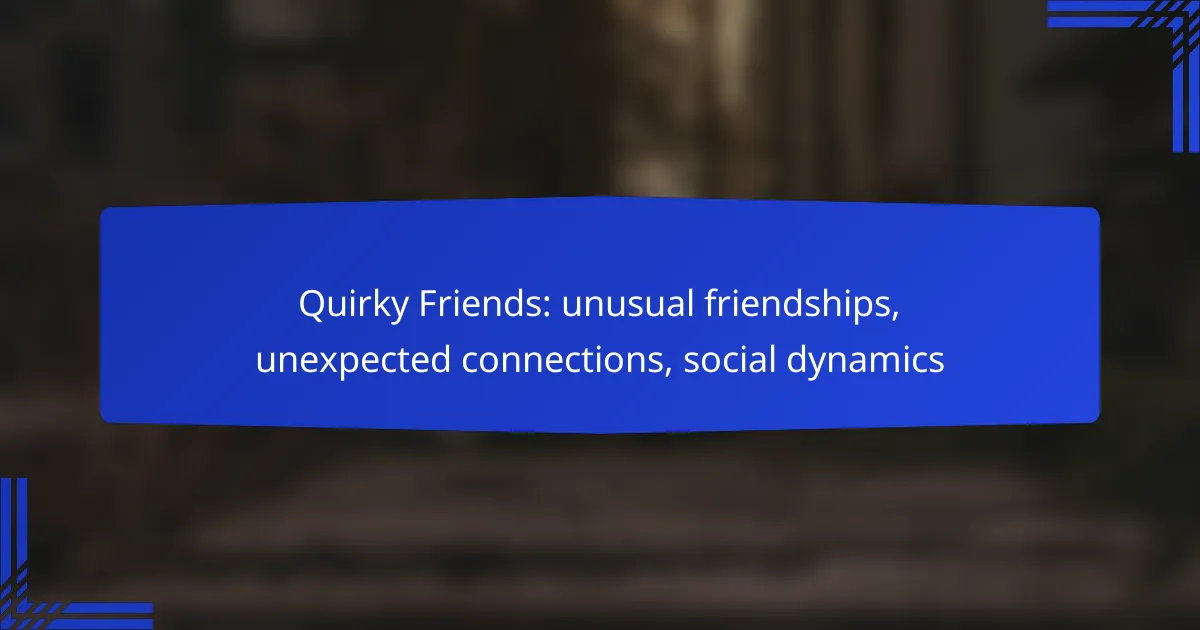Quirky friendships often emerge from unexpected connections, where individuals from diverse backgrounds come together through shared interests and experiences. These unusual bonds can enrich lives, offering unique perspectives and emotional support that traditional friendships may lack. However, navigating these relationships can present challenges, including social stigma and misunderstandings, which can test their resilience.
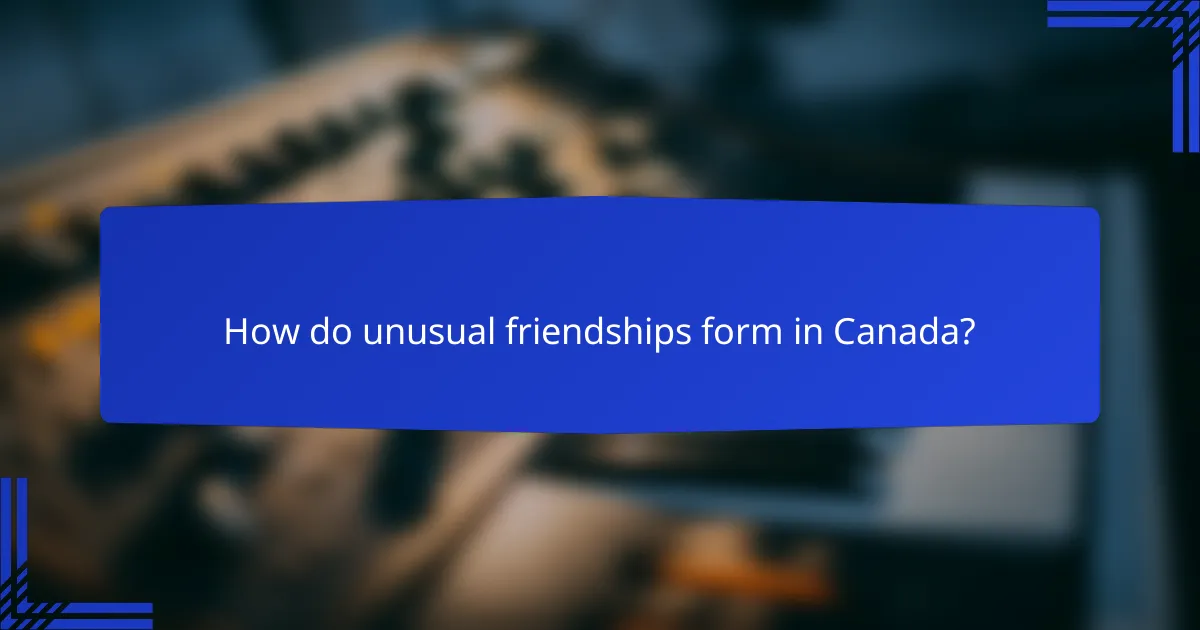
How do unusual friendships form in Canada?
Unusual friendships in Canada often develop through shared interests, common experiences, and social events that bring diverse individuals together. These connections can defy typical social norms and lead to unexpected bonds that enrich personal lives.
Shared interests
Shared interests serve as a foundation for unusual friendships, allowing individuals from different backgrounds to connect over common passions. Whether it’s a love for niche hobbies like birdwatching or unique culinary tastes, these interests can bridge gaps between people who might not otherwise interact.
For example, a knitting group that includes both retirees and young professionals can foster friendships based on a mutual love for crafting. Engaging in these activities together often leads to deeper conversations and connections beyond the initial interest.
Common experiences
Common experiences, such as attending the same school or participating in community events, can create a sense of camaraderie among individuals. These shared moments often lead to friendships that might seem unlikely at first glance, such as a bond between a newcomer and a long-time resident of a neighborhood.
In Canada, experiences like volunteering for local charities or participating in cultural festivals can unite people from diverse backgrounds, encouraging them to form friendships based on mutual understanding and support.
Social events
Social events play a crucial role in fostering unusual friendships by providing opportunities for people to meet and interact in relaxed settings. Events like local fairs, art exhibitions, or community sports can attract a wide range of attendees, facilitating connections among those who might not cross paths otherwise.
For instance, a food festival featuring various cuisines can bring together individuals with different cultural backgrounds, sparking conversations that lead to lasting friendships. Attending these events with an open mind can enhance the likelihood of forming unexpected connections.
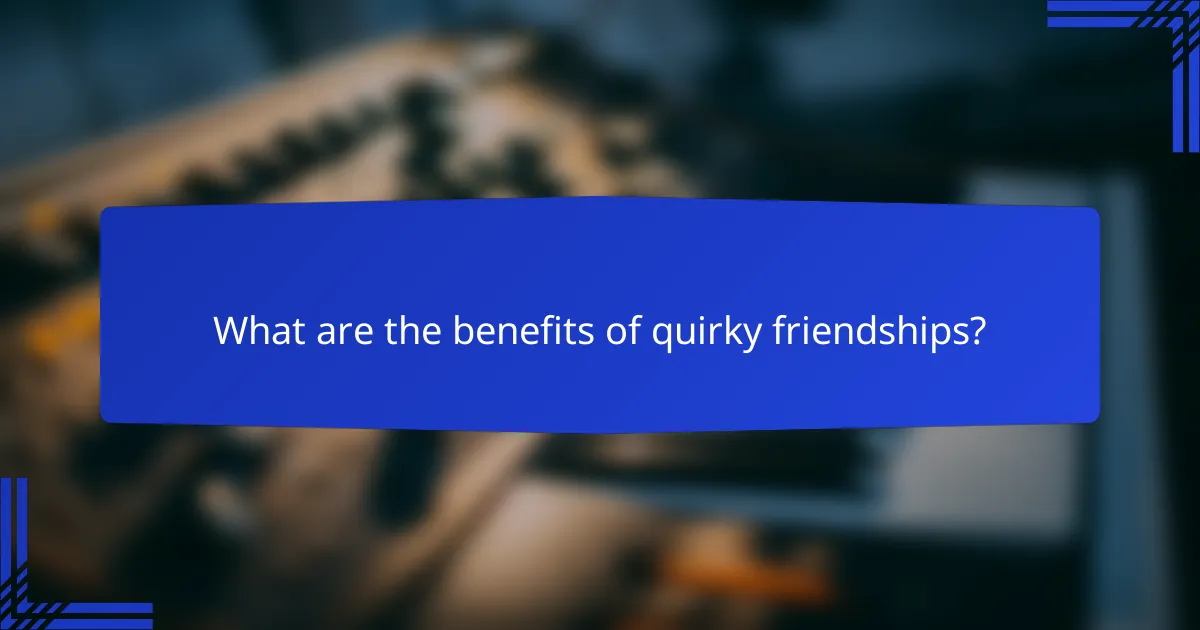
What are the benefits of quirky friendships?
Quirky friendships offer unique advantages that can enhance emotional well-being, broaden perspectives, and stimulate creativity. These unusual connections often lead to unexpected support and insights that traditional friendships may not provide.
Emotional support
Quirky friendships can provide emotional support that is both unexpected and profound. Friends who think differently can offer fresh perspectives on personal challenges, helping you navigate tough times with unique advice and encouragement.
For example, a friend with an unconventional outlook may suggest alternative coping strategies that you hadn’t considered, making you feel more understood and less isolated. This type of support can be especially valuable during stressful periods.
Broadened perspectives
Having quirky friends exposes you to diverse viewpoints, which can significantly broaden your understanding of the world. These friendships encourage open-mindedness and can challenge your preconceived notions, leading to personal growth.
For instance, a friend from a different cultural background might introduce you to new traditions or ways of thinking, enriching your life experience. Engaging with diverse perspectives can foster empathy and improve your ability to communicate with others.
Enhanced creativity
Quirky friendships often spark creativity by combining different ideas and approaches. Friends who think outside the box can inspire you to explore new hobbies, artistic endeavors, or problem-solving techniques that you might not have considered alone.
Collaborative projects with these friends can lead to innovative outcomes. For example, brainstorming sessions with a friend who has an unconventional approach may result in unique solutions to challenges, making the creative process more enjoyable and fruitful.
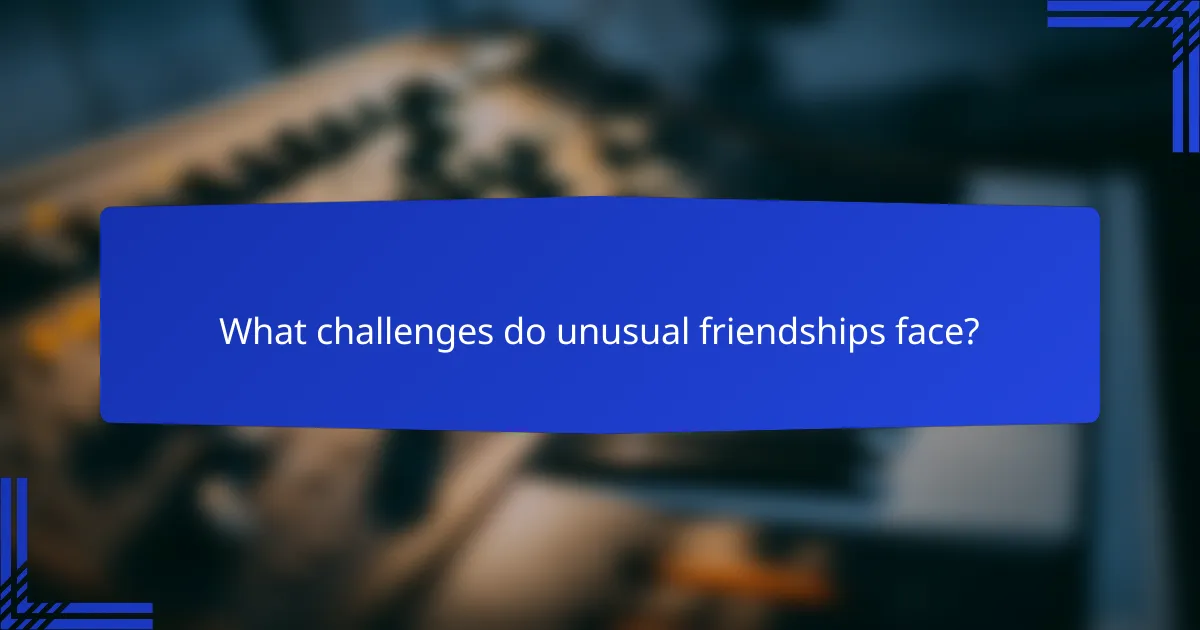
What challenges do unusual friendships face?
Unusual friendships often encounter several challenges that can strain the relationship. These include social stigma, misunderstandings, and distance issues, each of which can impact the dynamics of the friendship.
Social stigma
Social stigma refers to the negative perceptions that society may hold about unconventional friendships. Friends who come from different backgrounds, age groups, or cultures might face judgment from others, which can create pressure on the relationship.
To navigate social stigma, it’s essential for friends to support each other and communicate openly. Building a strong foundation based on mutual respect can help counteract external negativity.
Misunderstandings
Misunderstandings can arise in unusual friendships due to differing communication styles or cultural references. Friends may misinterpret each other’s intentions or feelings, leading to conflicts that could have been easily avoided.
To minimize misunderstandings, it’s beneficial to practice active listening and clarify any ambiguous statements. Regular check-ins can also help ensure both parties feel understood and valued.
Distance issues
Distance issues can pose significant challenges for unusual friendships, especially if friends live in different cities or countries. Physical separation can lead to feelings of isolation or neglect, making it harder to maintain the connection.
To overcome distance, friends can utilize technology for regular video calls or messaging. Setting specific times to connect can help maintain the relationship, ensuring both friends feel engaged despite the miles apart.
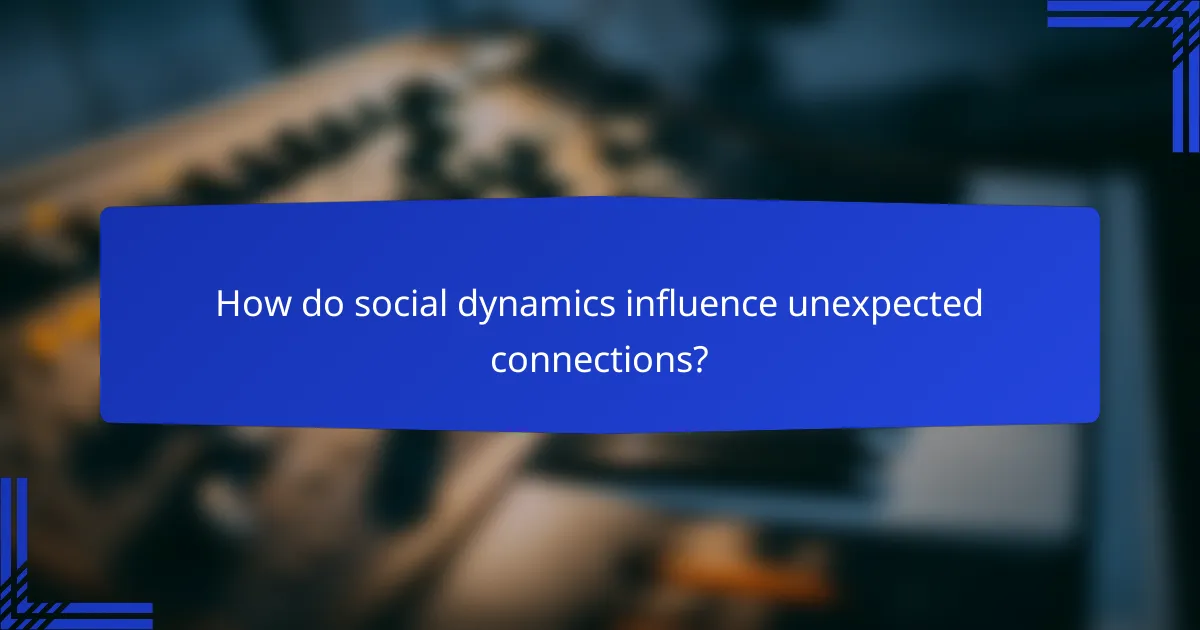
How do social dynamics influence unexpected connections?
Social dynamics play a crucial role in shaping unexpected connections by determining how individuals interact within groups. Factors such as group dynamics, social hierarchies, and cultural influences can either facilitate or hinder the formation of these unique relationships.
Group dynamics
Group dynamics refer to the patterns of interaction and behavior among members of a group. These dynamics can foster unexpected friendships when individuals with diverse backgrounds come together, leading to the exchange of ideas and experiences. For example, a team project in a workplace may bring together employees from different departments, resulting in new alliances that would not have formed in a more traditional setting.
To encourage positive group dynamics, promote open communication and collaboration. Activities that require teamwork can help break down barriers and encourage connections among participants.
Social hierarchies
Social hierarchies can significantly impact the formation of unexpected connections by influencing who interacts with whom. In many cases, individuals from lower social standings may feel hesitant to approach those in higher positions, limiting potential friendships. However, when hierarchies are less rigid, such as in informal settings, people may find it easier to connect across different social strata.
To navigate social hierarchies effectively, consider creating inclusive environments where everyone feels valued. Encourage networking opportunities that allow individuals from various backgrounds to engage without the constraints of traditional hierarchies.
Cultural influences
Cultural influences shape how individuals perceive relationships and friendships, affecting the likelihood of unexpected connections. Different cultures may prioritize community and collectivism, leading to more open interactions, while others may emphasize individuality, creating barriers to forming new friendships. Understanding these cultural nuances can help individuals navigate social situations more effectively.
To foster connections across cultures, be open to learning about different customs and practices. Engaging in cultural exchange activities can provide opportunities for individuals to bond over shared interests while appreciating their differences.
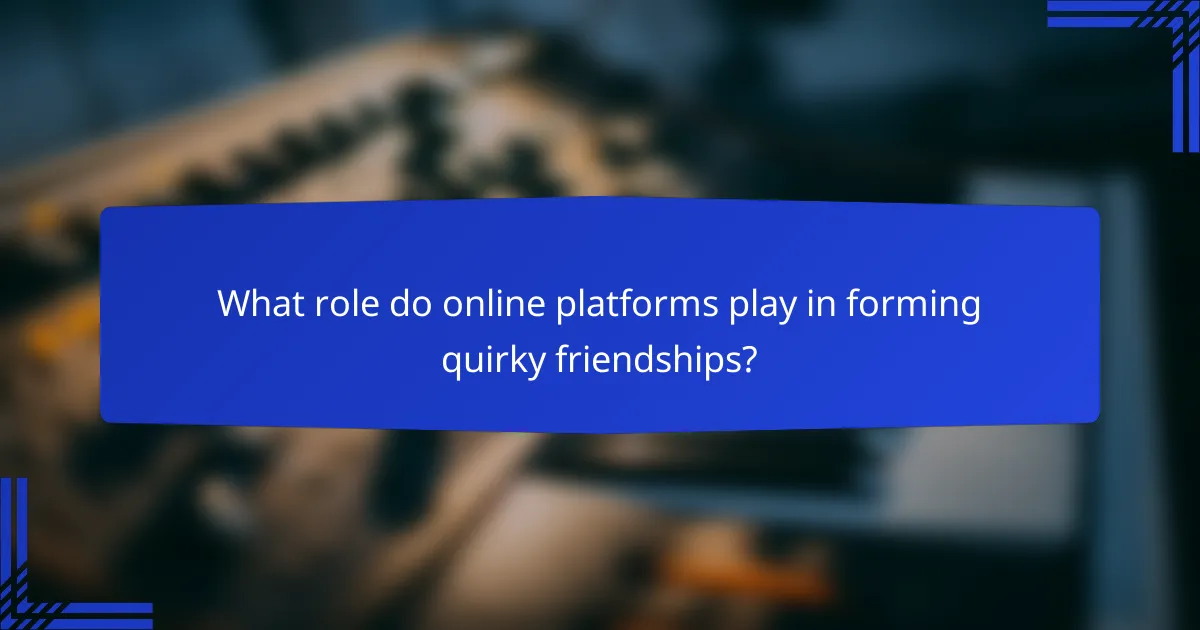
What role do online platforms play in forming quirky friendships?
Online platforms significantly facilitate the formation of quirky friendships by connecting individuals with shared interests, regardless of geographical barriers. These platforms enable users to discover and engage with others who have unconventional hobbies or perspectives, fostering unique social dynamics.
Social media connections
Social media platforms like Facebook, Instagram, and Twitter allow users to connect with a diverse range of people. Through groups, hashtags, and shared content, individuals can find others who share their unusual interests, leading to unexpected friendships. For example, someone passionate about collecting rare vinyl records can join a niche group and bond with fellow enthusiasts from around the world.
However, it’s essential to approach these connections with caution. Not everyone online is genuine, so verifying profiles and engaging in group discussions can help ensure that interactions are meaningful and safe.
Interest-based communities
Interest-based communities, such as Reddit or specialized forums, provide spaces for people to connect over specific topics. These platforms often host discussions that delve into quirky subjects like obscure films, unique cooking styles, or unconventional pets. Engaging in these communities can lead to friendships that are built on shared passions and experiences.
To maximize the benefits of these communities, actively participate in discussions and share your insights. This involvement can help you stand out and attract like-minded individuals who appreciate your unique perspective.
Virtual events
Virtual events, including webinars, online workshops, and gaming sessions, create opportunities for individuals to meet others with similar interests. These events often attract a diverse audience, allowing for quirky friendships to blossom in real-time interactions. For instance, a virtual trivia night focused on niche topics can bring together participants who may never have crossed paths otherwise.
When attending virtual events, engage actively by asking questions and contributing to discussions. This proactive approach can enhance your experience and increase the likelihood of forming lasting connections with fellow attendees.
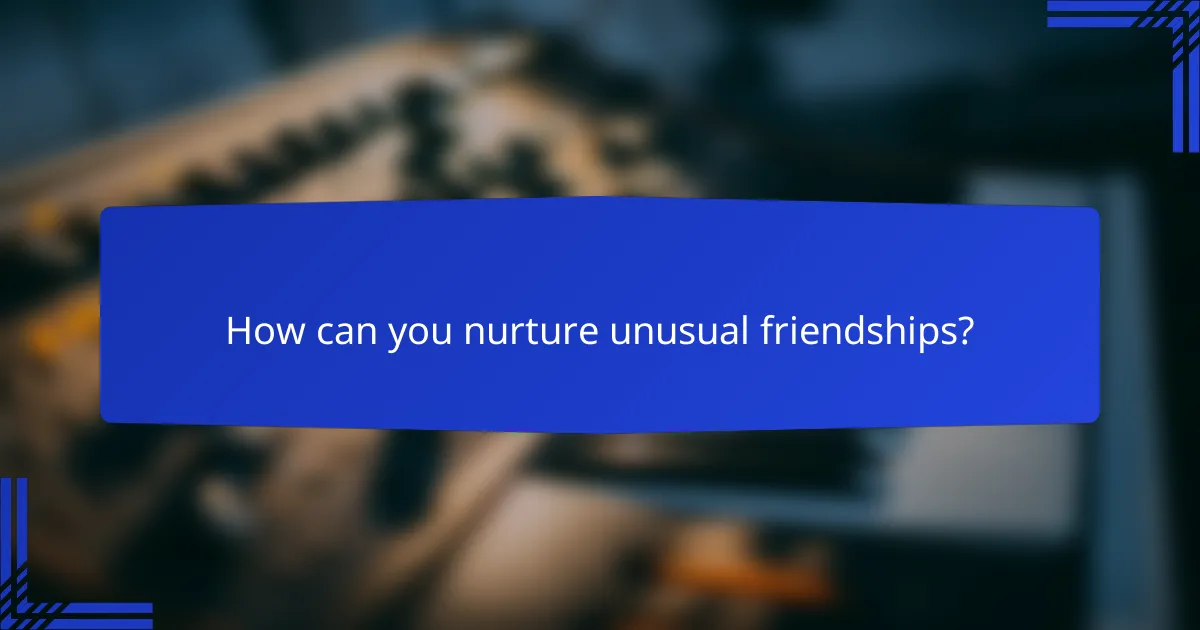
How can you nurture unusual friendships?
Nurturing unusual friendships involves intentional effort and genuine interest in the other person. By fostering open communication and shared experiences, you can strengthen these unique connections.
Regular communication
Maintaining regular communication is essential for nurturing unusual friendships. This can be achieved through various channels such as text messages, phone calls, or social media interactions, allowing you to stay updated on each other’s lives.
Consider setting a routine for check-ins, whether it’s a weekly phone call or a monthly coffee meetup. Consistency helps build trust and shows that you value the relationship.
Be mindful of the other person’s communication style. Some may prefer brief messages, while others enjoy longer conversations. Adapting to their preferences can enhance the connection and make interactions more enjoyable.
